
Content
Gender balance on corporate boards
March Event: the future of Creativity, Arts & Consciousness
April Event: the future of Women in Business
Video games bring new life to old brains
The Age of Inequality: Farm Crisis, Food Crisis & Media
Club of Amsterdam blog
News about the Future
Recommended Book: Lean In: Women, Work, and the Will to Lead
Enabling human high-performance and well-being
Futurist Portrait: Lisa Bodell
Welcome to the Club of Amsterdam Journal.
Join the Club of Amsterdam in March the future of Creativity, Arts & Consciousness, Thursday, March 27, 2014
An event in Amsterdam and Los Angeles!
A collaboration between c3: Center for Conscious Creativity and Vortex Immersion Media in Los Angeles and the Club of Amsterdam.
Humanity has been creating culture and telling stories since the days of early humans when man applied pigments to the walls of caves and told stories around the campfire. Stories are the river that runs through time and the tools and technologies that we design become the rivulets, streams and whirlpools that give us new ways to express our experiences. The human genius has created such fantastic ways to express and share creativity — from music, dance, poetry, visual art and architecture to the book to the theater, from radio to cinema, television, and now the worldwide web and beyond…we now have the tools and the ability to express our stories and culture on a global level. At the same time we are learning more about the nature of the brain and human consciousness. We are unlocking the mysteries of spiritual traditions and discovering the power of meditation to activate greater awareness and health. We are learning how the arts and media effect us and how we can effect others with our art and stories. Where are we headed? Let’s explore possibilities….
and our April Season Event about the future of Women in Business, Thursday, April 24, 18:30 – 21:15
Felix F Bopp, Founder & Chairman
Gender balance on corporate boards
Gender balance on corporate boards > Europe is cracking the glass ceiling
European Commission
March 2014
European Commission actions to promote gender balance on the boards of listed companies in the European Union
Although today 60% of new university graduates are female, women are outnumbered by men in leadership positions in the corporate sector in the EU. On average, a mere 17.8% of board members of the largest publicly listed companies in the EU are women. The issue has been the focus of intense public debate initiated by Vice-President Viviane Reding. Indeed, not taking advantage of the skills of highly qualified women constitutes a waste of talent and a loss of economic growth potential. Various studies suggest that companies with a higher representation of women at the most senior levels deliver better organisational and financial performance.
How many women and men are there in leadership positions across
the Member States?
In October 2013, the average share of women on the boards of the largest publicly listed companies registered in the EU-28 Member States reached 17.8%. This represents a rise of 1.2 percentage points in the six months since April 2013 (16.6%). There are only five countries – Finland, France, Latvia, Sweden and the Netherlands – in which women account for at least a quarter of board members.
Representation of women and men on the boards of large listed companies in the EU, October 2013
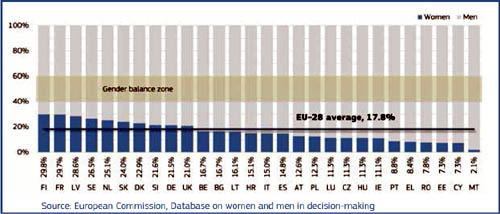
Little change in the top executive positions
When looking at top executive positions, the numbers are even bleaker: fewer than three in one hundred (2.8%) of the largest listed companies in Europe have a woman CEO (Chief Executive Office). Despite some progress in boardrooms, the level of female representation in the top executive position has hardly changed over the past two years.
Change in the share of women CEOs, EU-28, October 2011 – October 2013
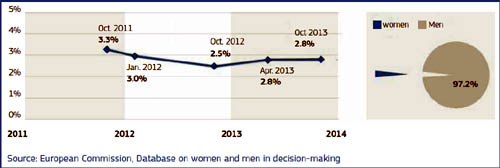
Accelerated progress driven by political and regulatory pressure
With its Strategy for Equality between Women and Men, the European Commission put the issue of women on boards high on the political agenda already in 2010. In 2011 it called for credible self-regulation by companies to ensure better gender balance in companies’ supervisory boards. One year later it became clear that progress was not visible, which is why in November 2012 the Commission put forward a law – a procedural quota, which ensures that women get a fair chance in the recruitment process.
From 2003 to 2010 the share of women on boards rose from 8.5% to 11.9%, an increase of 3.4 percentage points or an average of 0.5 pp/year. Since October 2010, the share has risen 5.9 pp in 3 years, an average of 2.0 pp/year, four times the previous rate of change.
Representation of women and men on the boards of large listed companies in the EU, October 2003 – October 2013
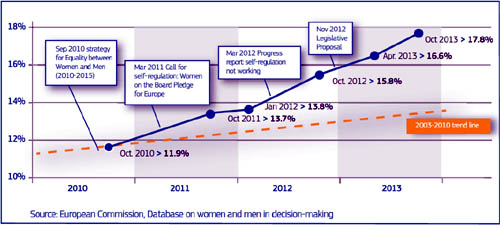
Significant progress concentrated in a few Member States
In the three years from October 2010 to October 2013 the share of women on boards increased in 22 of the 28 Member States. The largest percentage point increases were recorded in France (+17.4 pp), Slovenia (+11.8 pp), Italy (+10.4 pp), the Netherlands (+10.2 pp) and Germany (+8.8 pp). Most of the significant improvements took place in countries that have taken or considered legislative action or had an intensive public debate on the issue.
Change in the share of women on boards, EU-28, October 2010 – October 2013
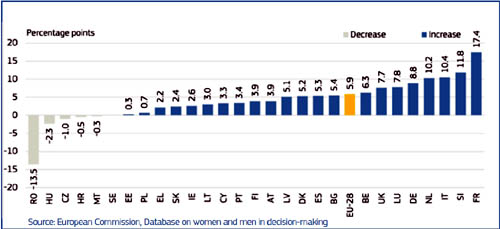
The impact of the European Commission’s proposal for legislation
Noting the slow rate of change, the European Commission – with the strong support of the European Parliament and a number of Member States – decided that taking legislative action was necessary to ensure and to drive progress. On 14 November 2012, it put forward the proposal for a Directive establishing a procedural quota.
The Commission proposal establishes an objective for a minimum of 40% of each sex amongst non-executive directors by 2020. If a company does not reach this threshold, it will have to apply clear and gender-neutral selection criteria in the selection process. In case of equal qualification, priority will have to be given to the candidate of the under-represented sex. The proposal enhances fairness and transparency in board selection processes by pushing companies to take a broader base of candidates from the outset. Qualification and merit remain the key criteria for a job on the board.
On 20 November 2013, the European Parliament voted with a strong majority to back the proposed Directive. The legislation was adopted on its first reading, confirming the broad consensus to increase gender balance on corporate boards and general endorsement of the Commission’s approach. The Directive is currently being discussed by the Council of the EU.
March Event: the future of Creativity, Arts & Consciousness
the future of Creativity, Arts & Consciousness, Thursday, March 27, 2014 Location in Amsterdam: Mediamatic, Van Gendthallen (next to Roest), VOC-kade 10, Amsterdam The conference language is English. A collaboration between c3: Center for Conscious Creativity and Vortex Immersion Media in Los Angeles and the Club of Amsterdam. For information about the event in Los Angeles, March 27, 9:30am – 12:15 (Los Angeles time), see The Vortex Dome, www.thevortexdome.com The speakers and topics are Los Angeles Kate McCallum, Founder, c3: Center for Conscious Creativity, Vice President, Vortex Immersion Media, Inc Transmedia, Transformation and the Future of Content Amsterdam Felix B Bopp, Chairman, Club of Amsterdam Travelling in Space and Time – a personal journey Los Angeles Ed Lantz, President and CTO of Vortex Immersion Media, Inc Immersive Media, Art and Consciousness Amsterdam Jack Gallagher, Artistic Director, Bodies Anonymous Vigorous Risk and our moderator in Amsterdam is Paul Hughes, Ten Meters of Thinking Part II Open discussion Amsterdam connects with Los Angeles … a dialogue between the two cities Exhibition in Amsterdam with Roni Peled, Jelena Popadic, Job Romijn, Robert Shepherd, Winston Nanlohy and Maartje van Buuren.     |
April Event: the future of Women in Business
| the future of Women in Business, April 24, 2014, 18:30 – 21:15 Location: Geelvinck Museum, Herengracht 518, 1017 CC Amsterdam Supported by the Amsterdam Economic Board. The conference language is English. Mylena Pierremont, Founding Partner, Ming Pai Consulting It is smart business to get more women in business Colby Stuart, International Creative Director, Quantum Brands BV Beyond gender differences in the world of business Cristiane de Morais Smith, Professor in Theoretical Physics, Utrecht University Caro Bamforth, Director of Corporate Communications, Vlisco The international business woman – ?? our Moderator is Annegien Blokpoel, CEO, PerspeXo     |
Video games bring new life to old brains
The generation that once invented PacMan now runs a home for the elderly, complete with video game booths. An example of Japanese video game makers moving towards an older demographic.
Researchers in California are developing video games aimed at helping older people preserve their cognitive abilities as they age. The games are designed to improve communication between different parts of the brain, boosting memory function and the ability to stay focused.
The Age of Inequality: Farm Crisis, Food Crisis & Media
This is the video of Extra Mural Lecture conducted on 10 February 2011. Mr. Palagummi Sainat talks about inequality in India.
Palagummi Sainath (born 1957) is an Indian journalist and photojournalist focusing on social problems, rural affairs, poverty and the aftermaths of globalization in India. He calls himself a ‘rural reporter’ or simply a ‘reporter’. He is the Rural Affairs Editor for The Hindu, and the website India Together has been archiving some of his work in The Hindu daily for the past six years. Amartya Sen has called him “one of the world’s great experts on famine and hunger”. Recently he also started People’s Archive of Rural India (PARI).
Mr. P. Sainath, Rural Affairs Editor of The Hindu, is a recipient of the prestigious Ramon Magsaysay Award, for Journalism Literature and Creative Communications Arts. In a 30-year career as a journalist, he has won close to 40 global and national awards for his reporting. He is someone who has turned down country’s highest civilian award to a set a benchmark for journalistic ethics. Sainath’s book “Everybody Loves a Good Drought: Stories from India’s Poorest Districts” has remained a non-fiction bestseller by an Indian author for years. Sainath’s current work involves a series on the devastation of Indian agriculture by anti-farmer policies this past decade which runs in The Hindu. Consisting of detailed reports from the households of landless labourers and marginal farmers across the country, he has published over 150 investigative reports on the agrarian crisis in The Hindu alone. Inspired by Sainath’s work, Canadian documentary maker Joe Moulins has produced a documentary entitled “A Tribe of His Own: The Journalism of P. Sainath”, till date it has won 14 international awards.
Club of Amsterdam blog

Club of Amsterdam blog
http://clubofamsterdam.blogspot.com
The Ukrainian Dilemma and the Bigger Picture
by Hardy F. Schloer, Owner, Schloer Consulting Group – SCG, Advisory Board of the Club of Amsterdam
The impact of culture on education
by Huib Wursten, Senior Partner, itim International and
Carel Jacobs is senior consultant/trainer for itim in The Netherlands, he is also Certification Agent for the Educational Sector of the Hofstede Centre.
What more demand for meat means for the future
by Christophe Pelletier, The Happy Future Group Consulting Ltd.
Inner peace and generosity
by Elisabet Sahtouris, Holder of the Elisabet Sahtouris Chair in Living Economies, World Business Academy
ICT4D: Top trends for 2014
by Madanmohan Rao
TPP — copyright versus free speech
by Annie Machon, Director, LEAP Europe. Formerly MI5
Long-Term Science and Technology Policy – Russian Priorities for 2030
by Alexander Sokolov, Alexander Chulok, Vladimir Mesropyan
A couple of billion reasons why Africa is a priority for the future
by Christophe Pelletier, The Happy Future Group Consulting Ltd.
News about the Future

Report Release: 2013 – 2014 State of the Future
This is the 17th State of the Future report produced by The Millennium Project – a global participatory think tank with over 50 Nodes and about 5,000 participants around the world. The Millennium Project is listed among the top ten think tanks in the world for new idea/paradigm by the Go to Think Tank index of the Univesity of Pennsylvania and was selected by Computerworld as a laureate for its innovations in collective intelligence systems.

Indian Company Licenses Berkeley Lab Invention for Arsenic-free Water
“A lot of technologies to remove arsenic on the community- and household- scale have been donated. But if you go to these villages it’s like a technology graveyard,” said Gadgil, who heads the Lab’s Environmental Energy Technologies Division and is also a professor of civil and environmental engineering at UC Berkeley. “One study found that more than 90 percent failed within six months, and then were abandoned to rust in the field.”
So Gadgil and his lab came up with ECAR, Electrochemical Arsenic Remediation, which binds arsenic using iron dissolved in water. Their innovation was two-fold. They created a technology that is exceptionally effective, inexpensive, and easy to maintain. And just as importantly, from the start they conceptualized a business model for implementing the technology in a way that creates incentives for its longevity. Now Indian company Luminous Water Technologies has licensed ECAR and plans to bring it to arsenic-affected villages throughout India and Bangladesh.
Recommended Book
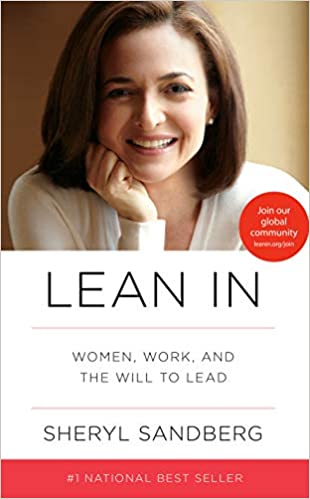
Lean In: Women, Work, and the Will to Lead
by Sheryl Sandberg
Thirty years after women became 50 percent of the college graduates in the United States, men still hold the vast majority of leadership positions in government and industry. This means that women’s voices are still not heard equally in the decisions that most affect our lives. In Lean In, Sheryl Sandberg examines why women’s progress in achieving leadership roles has stalled, explains the root causes, and offers compelling, commonsense solutions that can empower women to achieve their full potential.
Sandberg is the chief operating officer of Facebook and is ranked on Fortune’s list of the 50 Most Powerful Women in Business and as one of Time’s 100 Most Influential People in the World.
Enabling human high-performance and well-being

After more than a year of trying various new biomedical devices that promised a lot on paper but delivered little in real-life testing, MBA graduate of EPFL in Lausanne and expert in risk and technology management, Alexandros Giannakis, knew he was in front of something unique. CSEM, Switzerland’s most prestigious innovation centre had just completed the development of a new wearable technology for astronauts that addressed all the needs of the sports and medical/well-being markets. The technology, based on dry electrodes, offered groundbreaking new biometrical data of the highest quality and unparalleled levels of comfort for everyday and active life use. That was to become Sense.
Inspired by the technology and defying the surging financial crisis, Alexandros decided to found a company with the aim to create the best product in the field of human monitoring, enabling high-performance and well-being. Conscious that the target was to deliver maximum value to the end user and that data alone was not enough outside of a proper medical context, he set about finding the person to make this possible. Dr. Aki Hintsa, of Formula 1 renown, was that person, having developed a philosophy that enabled many athletes reach the peak of their sport, be it Formula 1, or Olympic Games and various World Championships. That was to become Core.
Since 2008 and until today, Alexandros and Aki have worked tirelessly together with a group of elite experts in order to combine Sense and Core and develop products that enable not only the monitoring of unique biometrical data but also the assessment of all areas that are related to human high-performance and well-being: health, training, biomechanics, recovery, nutrition and mental energy.
Futurist Portrait: Lisa Bodell
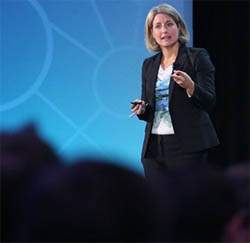
Lisa Bodell: “We’re so focused on productivity that thinking has become a daring act. Leaders have to create the space for thinking.”
“It’s easy to focus on what the big guys have – established brands, tested products, years of experience. But while larger businesses have size, scale, and a whole host of other advantages at their disposal, they have two enormous disadvantages: complexity and complacency.”
A globally recognized innovation leader and futurist, Lisa Bodell founded futurethink in 2003 to provide a simple approach to the otherwise complicated topic of innovation. Working with leading brands such as Starwood, Merck, and Bosch, futurethink has become the largest source of innovation research, tools, and training curricula in the world. She is the author of the provocative culture-change book, Kill the Company: End the Status Quo, Start an Innovation Revolution, which was named one of the Best Business Books of 2012 by booz&co.
After earning her business degree from the University of Michigan, Lisa launched her career at Leo Burnett in Chicago, where she discovered a gift for uniting strategically driven ideas with forward-thinking themes. She went on to build two successful businesses before moving to New York and focusing solely on the innovation space with futurethink.
With time-management skills that border on an art form, Lisa currently serves as an adviser on the boards of the Institute of Direct Marketing in London; the Association of Professional Futurists; the Institute for Triple Helix Innovation; and Novartis’ Diversity and Inclusion Board in Basel, Switzerland. Among her many academic activities, Lisa is a finalist judge at Idea Crossing’s Innovation Challenge held at University of Virginia, and has taught innovation and creativity at both American University and Fordham Universities.
A respected thought-leader on innovation topics, Lisa has appeared on FOX News, and in publications such as Fast Company, Forbes, Crain’s, Business Week, The New York Times, WIRED, Investor’s Business Daily, Harvard Business Review, and The Futurist. In addition to Kill the Company, Lisa co-wrote Success Simplified (Insight, 2011), a collection of result-driven strategies for business and life.
In her own life, she’s known for solving word scrambles, brain teasers, and logic puzzles with the speed of an Olympian. She can whip up five-course gourmet meals, though she’s yet to master a perfectly grilled burger. After traveling through more than 30 countries, Lisa has set her sights on visiting the North Pole so she can stand in every time zone – simultaneously.
‘Kill the Company’: Identify Your Weaknesses Before Your Competitors Do
Agenda

April 24, 2014
the future of Women in Business
Location: Geelvinck Museum, Herengracht 518, 1017 CC Amsterdam
Supported by the Amsterdam Economic Board.
May 29, 2014
the future of Green Architecture
Retrofitting existing houses and historic buildings.
Zero-energy buildings with low-exergy storage.
Location: Geelvinck Museum, Herengracht 518, 1017 CC Amsterdam
A collaboration between Geelvinck Museum and the Club of Amsterdam
June 26, 2013
the future of Transformation
Special Supporters







Customer Reviews
Thanks for submitting your comment!